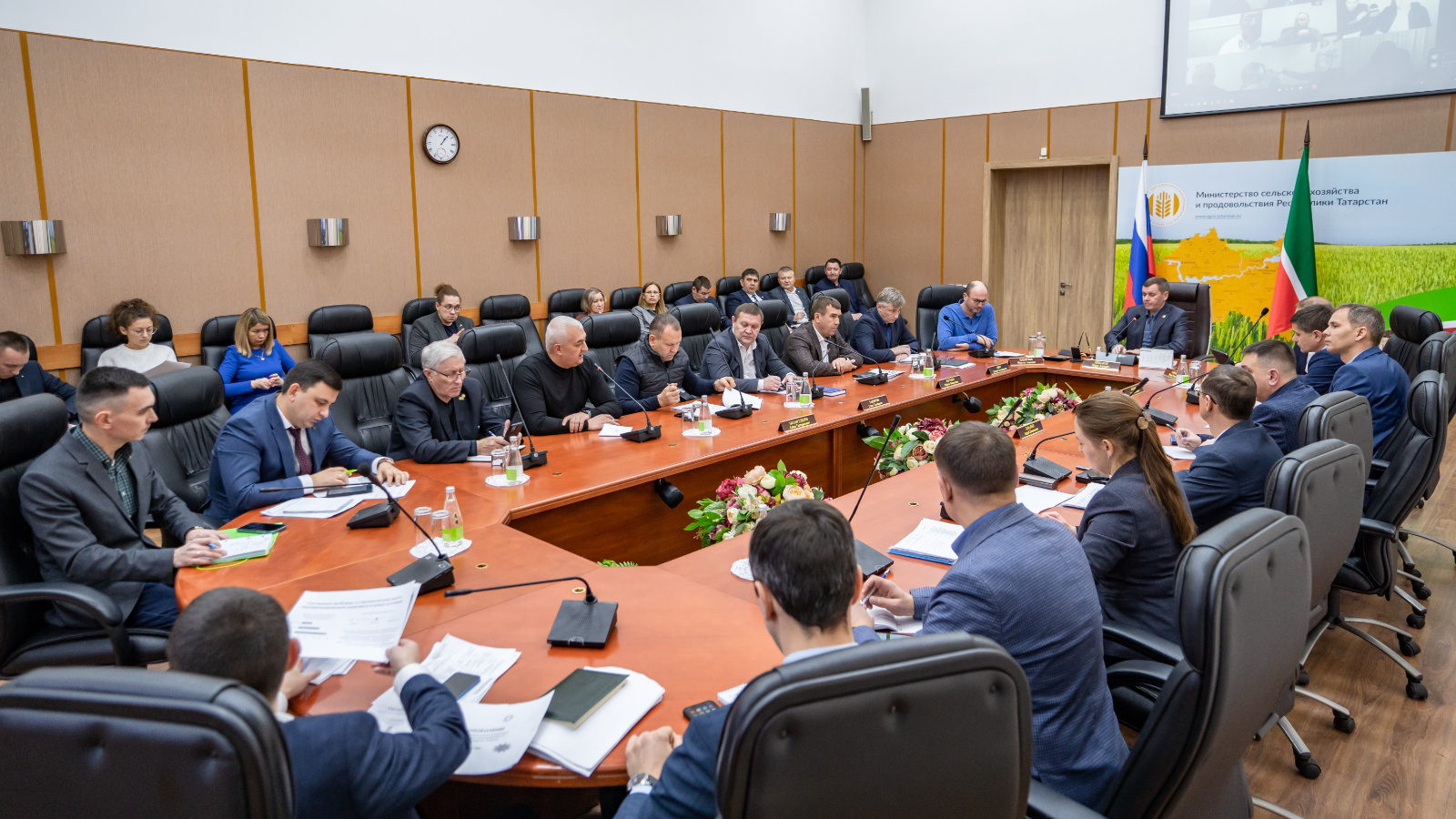The Ministry held a meeting on topical issues of the agro-industrial complex

Today, the Ministry of Agriculture and Food of the Republic of Tatarstan, chaired by the Deputy Prime Minister of the Republic of Tatarstan - Minister of Agriculture and Food of the Republic of Tatarstan Marat Zyabbarov, held a meeting via videoconferencing on issues of the agro-industrial complex of the Republic of Tatarstan. It was attended by First Deputy Minister Lenar Garipov, Deputy Ministers Marcel Makhmutov, Dmitry Yashin, Rafael Fattakhov, Gelyus Bayazitov, as well as the heads of the Administration of Agricultural and Industrial Management of the Republic of Tatarstan and large investors.
During the meeting, land and property issues were discussed, or rather, bringing into compliance the type of permitted use of agricultural land in order to reduce the tax burden on agricultural producers and the procedure for changing the type of permitted use of a land plot.
The Ministry of Land Property of the Republic of Tatarstan, the State Budgetary Institution "TsGKO" together with local governments will recalculate the cadastral value of land in order to reduce the tax burden on agricultural producers. Tenants and owners of land plots do not need to independently change the type of permitted use.
Next, Dmitry Yashin made a presentation; he spoke about the accumulation of mineral fertilizers and the plan for liming acidic soils in 2024. Today there are 33 kg of the active substance of mineral fertilizers, “Unfortunately, 11 municipal districts are in the red zone,” noted Dmitry Yashin.
Rafael Fattakhov in his report spoke about the results of the competition for placing equipment for autumn-winter storage and about monitoring the progress of equipment repairs for field work in 2024.
Gelyus Bayazitov also made a presentation. He focused on issues of milk production, cow numbers and livestock identification. The number of cows is the main indicator when providing subsidies per 1 kg of milk sold and for breeding support. With a reduction in the number of cows, agricultural enterprises will not be able to apply for subsidies in 2024. In 15 municipal districts there is a positive trend in the number of cows at the beginning of the year. 26 districts have lower livestock numbers.
“I ask the heads of district agricultural departments to conduct such an analysis on farms with a cow population of less than 200 heads and bring this information to all heads of agricultural units of the municipal district and take measures to restore the number of cows,” he emphasized.
Based on the results of 11 months of work, agricultural enterprises produced 1 million 530 thousand tons of milk with an increase of 142 thousand tons. Dairy districts such as Kukmorsky, Baltasinsky, Mamadyshsky, Sabinsky continue to increase their volumes. The average productivity for 11 months here exceeded 8,300 kg per cow. Menzelinsky district increased its volumes by 2 times. Menzelinsky, Elabuga, Bugulminsky and Muslyumovsky districts also milked more than 8 thousand per cow.
The head of the Main Veterinary Department of the Cabinet of Ministers of the Republic of Tatarstan, Almaz Khisamutdinov, noted that if farms do not comply with the biological safety of their enterprises, then the introduction and spread of diseases such as foot-and-mouth disease, nodular dermatitis, brucellosis, tuberculosis and other diseases cannot be ruled out.
“Saving money on biosecurity, at any moment the farm can completely lose its livestock. And this alone amounts to hundreds of millions of direct losses, and maybe more,” he noted.
Currently, 67 livestock enterprises have been surveyed in Nurlatsky, Aksubaevsky, Chistopolsky, Novosheshminsky, Drozhzhanovsky, Apastovsky, Kaybitsky, Tetyushsky, Kamsko-Ustinsky and Verkhneuslonsky districts. In all of them, violations were identified that do not comply with the requirements of veterinary legislation.
The most frequently detected violations: the territory of the farm is not fenced, there is no disinfection barrier at the entrance (exit) to the territory of the farm, walking areas do not have canopies, and are not equipped with a sanitary checkpoint for changing clothes and shoes.
In conclusion, the head of the department of science, education and innovative technologies, Lenar Zainullin, made a report. He spoke about the implementation of the agricultural classes project in municipal areas.